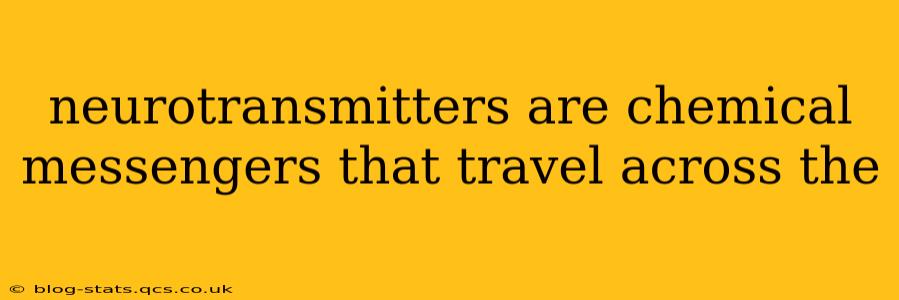Neurotransmitters: Chemical Messengers of the Brain and Body
Neurotransmitters are chemical messengers that travel across the synapse, a tiny gap between two nerve cells (neurons). They're essential for communication within the nervous system, influencing everything from our mood and movement to our thoughts and memories. Understanding how these vital chemicals function is key to comprehending brain function and various neurological and psychological conditions.
This detailed exploration will delve into the fascinating world of neurotransmitters, covering their role in communication, the diverse types, and the implications of imbalances.
What is a synapse, and how do neurotransmitters cross it?
The synapse is the crucial junction between two neurons. When a nerve impulse reaches the end of a neuron (the presynaptic neuron), it triggers the release of neurotransmitters stored in vesicles (small sacs) within the neuron's terminal buttons. These neurotransmitters then diffuse across the synaptic cleft (the gap between the neurons) to bind with receptor sites on the receiving neuron (the postsynaptic neuron). This binding initiates a response in the postsynaptic neuron, either exciting or inhibiting its activity, thus relaying the signal. Think of it as a tiny chemical bridge enabling communication between nerve cells.
What are the different types of neurotransmitters, and what are their functions?
There's a diverse range of neurotransmitters, each with specific roles:
-
Acetylcholine (ACh): Crucial for muscle action, memory, and learning. Low levels have been linked to Alzheimer's disease.
-
Dopamine: Involved in reward, motivation, pleasure, and motor control. Imbalances are associated with Parkinson's disease and schizophrenia.
-
Serotonin: Plays a vital role in mood regulation, sleep, appetite, and digestion. Low levels are often linked to depression and anxiety.
-
Norepinephrine (Noradrenaline): Influences alertness, arousal, and the "fight-or-flight" response. Plays a role in anxiety and stress.
-
Epinephrine (Adrenaline): Similar to norepinephrine, it's primarily involved in the body's stress response.
-
GABA (Gamma-aminobutyric acid): The primary inhibitory neurotransmitter in the central nervous system. It helps regulate anxiety and sleep. Low levels are linked to anxiety disorders.
-
Glutamate: The primary excitatory neurotransmitter in the central nervous system. It plays a crucial role in learning and memory. Excessive glutamate can be neurotoxic.
-
Endorphins: Natural pain relievers and mood elevators, often released during exercise or other pleasurable activities.
How do neurotransmitters affect mood and behavior?
Neurotransmitter imbalances significantly impact mood and behavior. For instance, a deficiency in serotonin is strongly associated with depression, while low dopamine levels can contribute to Parkinson's disease and decreased motivation. Conversely, excessive dopamine can be implicated in certain aspects of schizophrenia. GABA's inhibitory function is crucial for anxiety regulation; imbalances can lead to anxiety disorders. The intricate interplay of these neurotransmitters shapes our emotional experiences and behavioral patterns.
What happens when there is an imbalance of neurotransmitters?
Neurotransmitter imbalances can lead to a wide array of neurological and psychological disorders. Conditions like depression, anxiety, schizophrenia, Parkinson's disease, and Alzheimer's disease are often associated with disruptions in the production, release, or reuptake of neurotransmitters. This highlights the crucial role of neurotransmitters in maintaining overall neurological and psychological health. Treatment often aims to restore neurotransmitter balance through medication or other therapeutic interventions.
How are neurotransmitters involved in learning and memory?
Learning and memory processes heavily rely on synaptic plasticity, which is the ability of synapses to strengthen or weaken over time. Neurotransmitters like glutamate and acetylcholine play crucial roles in this process. Glutamate's excitatory action promotes long-term potentiation (LTP), a mechanism underlying learning and memory formation. Acetylcholine is involved in various aspects of memory consolidation and retrieval. Damage to systems involving these neurotransmitters can severely impair learning and memory functions.
What are some ways to support healthy neurotransmitter levels?
While not a substitute for professional medical advice, adopting a healthy lifestyle can contribute to supporting healthy neurotransmitter levels. This includes:
-
Nutritious Diet: A balanced diet rich in fruits, vegetables, and omega-3 fatty acids is essential.
-
Regular Exercise: Physical activity boosts neurotransmitter production and improves overall brain health.
-
Sufficient Sleep: Adequate sleep allows for neurotransmitter replenishment and consolidation of memories.
-
Stress Management: Chronic stress depletes neurotransmitters. Practicing stress-reduction techniques is crucial.
This information is for educational purposes only and should not be considered medical advice. Always consult with a healthcare professional for any concerns about neurotransmitter imbalances or neurological and psychological conditions.
